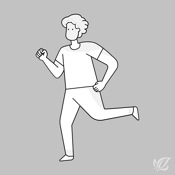Seniors and older adults who are 65 or older have a higher risk of stroke, heart attack, or coronary heart disease. Roughly 85.6 million adults in the United States have been diagnosed with heart disease, and roughly half of that number is over 60. This includes heart problems such as heart failure, coronary artery disease, or other heart problems.
In fact, heart disease is the leading cause of death in the United States. The good news is that more often than not, it is also preventable. February is American Heart Month, and its aim is to promote Heart and Vascular health awareness. By raising awareness, heart month aims to educate others about cardiovascular disease risks, and help to stop preventable complications.
Being aware of heart health is important, but it doesn’t have to be complicated. There are a number of simple lifestyle changes adults and seniors can do to help boost heart health, and keep an active and healthy lifestyle, even as you age.
What Are the Risk Factors for Heart Disease?
Age is one of the largest factors in increasing the chances of developing heart disease, but there are also a number of other factors which can lead to poor heart health. Those with underlying cardiology conditions such as high blood pressure (also known as hypertension), high cholesterol, or blood sugar conditions like diabetes are more likely to be at risk, and should be extra aware of their heart health.
A family history of heart disease can also play a role in some cases. Certain forms of heart disease have been linked to genetics, and a family history can increase the likelihood of developing heart disease yourself.
Lifestyle factors such as smoking, obesity, or having an unhealthy diet can also increase chances of heart complications, but are luckily factors which are within our control to change.
How Can You Improve Heart Health?
There are a number of ways which we can all work towards having better heart health. Building healthy habits into your daily routine can help reduce your risk factors, and improve overall health levels, leading to a long and healthy life.
1. Stay active
 Regular physical activity is important for overall health, but is also key to heart health. Improving physical fitness, and getting your heart rate up is also a good way to keep your heart muscles strong. Staying active is one of the easiest ways to reduce the leading risk factors like high cholesterol and high blood pressure which in turn decreases your risk of heart attack.
Regular physical activity is important for overall health, but is also key to heart health. Improving physical fitness, and getting your heart rate up is also a good way to keep your heart muscles strong. Staying active is one of the easiest ways to reduce the leading risk factors like high cholesterol and high blood pressure which in turn decreases your risk of heart attack.
Activities do not need to be strenuous, either, and are very senior friendly. Going for a brisk walk, doing water aerobics or swimming, gardening, or dancing can all get your heart pumping and your blood flow moving, leading to healthy hearts and bodies.
Senior living communities like Pacifica Senior Living host senior friendly activities that will help you with heart health. You can also reach out to your health care provider if you are uncertain what activities are best or safe for you.
2. Follow a heart-healthy diet
 Healthy eating is one of the simple ways you can take control of your health. Eating whole grains, and fruits and vegetables high in vitamins, minerals and fibers, can help improve heart health. Limiting unhealthy fats, like saturated fats, and switching to low-fat dairy options can also help to reduce cholesterol levels. Alternatively, omega-3 fatty acids are a great addition to your diet. Swapping from red meats to fatty fish can be a great way to get more omega 3 and cut down on ‘bad fats’. Lastly, limiting or reducing sodium (or salt) intake, and monitoring your sugar levels are also important - especially if you have high blood pressure or diabetes. If you feel you are missing key vitamins of minerals from your diet, supplements can also help support healthy eating.
Healthy eating is one of the simple ways you can take control of your health. Eating whole grains, and fruits and vegetables high in vitamins, minerals and fibers, can help improve heart health. Limiting unhealthy fats, like saturated fats, and switching to low-fat dairy options can also help to reduce cholesterol levels. Alternatively, omega-3 fatty acids are a great addition to your diet. Swapping from red meats to fatty fish can be a great way to get more omega 3 and cut down on ‘bad fats’. Lastly, limiting or reducing sodium (or salt) intake, and monitoring your sugar levels are also important - especially if you have high blood pressure or diabetes. If you feel you are missing key vitamins of minerals from your diet, supplements can also help support healthy eating.
You can learn more about heart healthy eating here.
3. Maintain a healthy weight
 Hand in hand with health eating and keeping active, is maintaining a healthy weight. Higher levels of body fat can increase your risk of heart disease, especially coronary artery disease. Excess weight and fat can lead to increased fatty tissue in your arteries. Since these are the pathways that allow blood vessels to flow throughout your body, the more they become restricted, the higher your chances of stroke or heart attack. High BMIs can also lead to risk factors such as high blood pressure, diabetes, and the like. Eating appropriate serving sizes, and health foods can help you maintain a healthy weight.
Hand in hand with health eating and keeping active, is maintaining a healthy weight. Higher levels of body fat can increase your risk of heart disease, especially coronary artery disease. Excess weight and fat can lead to increased fatty tissue in your arteries. Since these are the pathways that allow blood vessels to flow throughout your body, the more they become restricted, the higher your chances of stroke or heart attack. High BMIs can also lead to risk factors such as high blood pressure, diabetes, and the like. Eating appropriate serving sizes, and health foods can help you maintain a healthy weight.
4. Quit smoking
 Smoking leads to a large number of complications that can result in death. Smoking increases the risk of heart disease and heart attack and can also make existing heart conditions worse. Smoking directly damages the walls of your arteries, weakening them drastically. By quitting smoking you can stop this damage, and lower your risks. Even quitting later in life is helpful, as it will allow your body the chance to start repairing some of the internal damage.
Smoking leads to a large number of complications that can result in death. Smoking increases the risk of heart disease and heart attack and can also make existing heart conditions worse. Smoking directly damages the walls of your arteries, weakening them drastically. By quitting smoking you can stop this damage, and lower your risks. Even quitting later in life is helpful, as it will allow your body the chance to start repairing some of the internal damage.
5. Reduce stress levels
 Stress is a big factor when it comes to heart attacks as it can also contribute to high blood pressure and other heart disease risk factors. Stress takes a toll on everyone in different ways, but it has been known to cause an increased risk of heart attack, depression, weakened immune systems, and body pain. Eliminating stress where possible will help to reduce these risk factors.
Stress is a big factor when it comes to heart attacks as it can also contribute to high blood pressure and other heart disease risk factors. Stress takes a toll on everyone in different ways, but it has been known to cause an increased risk of heart attack, depression, weakened immune systems, and body pain. Eliminating stress where possible will help to reduce these risk factors.
6. Get plenty of sleep

Having good, deep sleep is important for overall good health - mentally and physically. Not only is sleep linked to brain health, but it can also affect your heart health. Having a calm and consistent bedtime routine can help you get deep, meaningful sleep, which your body needs to recuperate and recharge from all you do in a day.
7. Get Screened
 Early heart disease is hard to notice, so ensuring you have regular checkups and screenings with a health professional is a key part of understanding your own heart health. Visit your doctor and schedule regular health checks to help catch early signs or symptoms.
Early heart disease is hard to notice, so ensuring you have regular checkups and screenings with a health professional is a key part of understanding your own heart health. Visit your doctor and schedule regular health checks to help catch early signs or symptoms.
What Are the Symptoms of Heart Disease?
Knowing the signs and symptoms of heart disease or a heart attack is also important to ensuring your overall wellbeing and heart health. Being able to catch early warning signs, or be able to deal with a heart attack, should one occur, is vital in keeping you healthy - and could even save a life.
There are, however, some key signs to look out for which may be indications of underlying heart problems. If you feel one or more of these symptoms, reach out to a doctor, cardiologist, or medical professional.
- Pain, numbness, or tingling sensations
- Shortness of breath or trouble breathing
- Chest pain during physical activity
- Lightheadedness, dizziness, or confusion
- Headaches
- Cold sweats
- Nausea/vomiting
- Tiredness or fatigue
- Swelling of the ankles, feet, legs, stomach, and/or neck
What Are the Symptoms of a Heart Attack?
- Chest pain or discomfort
- Feeling weak, light-headed, or faint
- Radiating pain or discomfort in the jaw, neck, or back
- Pain (usually sharp) or discomfort in one or both arms or shoulders
- Shortness of breath
If you experience these symptoms, call 911 or an emergency response team immediately, and chew two aspirin while waiting for emergency aid.
Ensuring a healthy diet, active lifestyle and forming health conscious habits is a great step forward in maintaining good heart health and promoting overall wellness. Staying informed through resources like the American heart Association is another great way to boost your knowledge and health. Initiatives like Wear Red Day and American Heart Month can help spread awareness and understanding about cardiovascular health so we can all work towards living a heart healthy lifestyle, and reducing heart related deaths in America.
